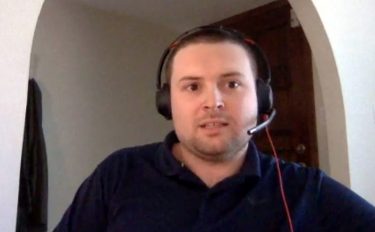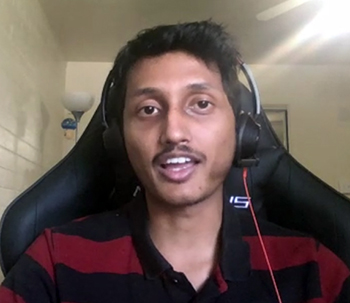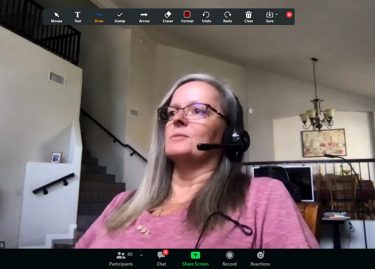
By Lana Sweeten-Shults
GCU News Bureau
Amazon will add 500 jobs at its Tempe site over the next two years.
Mic drop.

And the company, whose aim is to be “the earth’s most customer-centric company,” also touts some 33,000 corporate and technology job openings across its 18 tech hubs, spanning from Tempe to Austin, Texas, to Denver and to its headquarters in Seattle.
That’s good news for Grand Canyon University students, some of whom sat in on the College of Science, Engineering and Technology's first Provost Speaker Series talk of the semester on Wednesday, a career-development event organized with the help of GCU's Strategic Employer Initiatives and Internships department.
In the 90-minute, COVID-adjusted virtual talk on Zoom, the panel of Amazon software development and front-end engineers covered everything from “How did you get that job at Amazon, anyway?” to “What’s a day like in the life of an ‘Amazonian’?” to “What is the culture like at the company?”
Students might have been surprised to learn that knowing how to code – and having that technical prowess when it comes to data structures and algorithms – is just a small part of what will land them a technology job like theirs at the company.
Demonstrating tech skills is a given since applicants usually will be asked to whiteboard a problem as part of the interview process.
“Make sure that you know your stuff,” said GJullian Flemister-King, an Amazon front-end engineer whose biggest advice to students was to not be a passive learner. “At the end of the day, in order to get in, you’re going to have to go through a series of interviews. If you don’t know your stuff, people are going to know. Everyone who’s interviewing you is pretty smart.”

“It’s more about the problem-solving,” added software development engineer Carson Howard, who started his career at Amazon in Seattle and now works on the Selling Partner Promotions team in Tempe. Interviewers want to see how an applicant thinks and works through a problem.
Beyond those technical skills, what the company is looking for from new hires is to get a feel for how they might fit the Amazon culture, Howard said.
All the panelists spoke about Amazon’s Leadership Principles. Just a few of the 14 principles:
- Customer Obsession ("Start with the customer and work backward.")
- Ownership ("Leaders never say, 'That’s not my job.'")
- Learn and Be Curious
- Think Big
- Invent and Simplify (“As we do new things, we accept that we may be misunderstood for long periods of time.”).
“Coding is not enough,” said software development engineer Vivek Panigrahy, a recent Arizona State University master’s graduate in computer science.

He remembers speaking with his manager and respectfully pushing for a different way to solve a problem. “You have to have the backbone to disagree,” said Panigrahy, who was hired at Amazon during the coronavirus pandemic and has not yet worked onsite among his peers but feels connected to them, even online.
“Have Backbone; Disagree and Commit” – it’s yet another one of the Leadership Principles.
“These Leadership Principles, you hear them throughout the day. … It’s really permeated throughout the culture in what we do on a day-to-day basis,” said Lisa Lobb, software development manager on the Selling Partner Promotions team.
Within the company, software development engineer Kevin Carrasco said Amazon’s teams also establish their own culture, though the Learning Principles unify the company and are at the heart of everything employees do.
Applicants who move forward after applying at amazon.jobs and taking online assessments to get an interview, as Panigrahy said he did, go to the interview portion of the application process.
By that time, interviewers are not focused on the finer details of an applicant's resume, the panelists said.
“I don’t have a computer science degree,” said Howard, who started with a business degree before moving into coding. “ … If you can demonstrate the skills we want to see, you have some practical experience to apply to it in some way or another, I’d probably be happy.”
Flemister-King also did not follow the traditional path to get to Amazon. The former Choice Hotels International employee started coding in 2017, refined his tech skills at Galvanize (a six-month trade school for coding), and gained experience by doing consulting work and “a lot of hackathons,” he said. He also was able to get a referral from an Amazonian whom he had gotten to know.
“It’s not about where you went to school and for how long. It’s can you pass the bar to get in and can you do the job,” added Lobb, who emphasized that Amazon’s engineers, whether they have a doctorate or no degree, are all are very sharp and can get the job done. “ … I think the path is different for everybody.”
The panelists also spoke about a day-in-their-life at Amazon.
It starts with the Stand-Up Meeting, when Amazonians address their team by answering three questions: What did you do yesterday? What is your highest priority today? And, do you have any blockers?
By the time those questions are answered, the team knows where it stands and can help team members who have “blockers,” anything that’s preventing them from moving forward in their task or project.
The panelists also spoke about work-life balance and Amazon’s motto: “Work Hard. Have Fun. Make History.”
“We DO work hard,” said Carrasco, but it’s the kind of work that, by its nature, is fun for him. “… The kinds of problems we’re solving are big-scale and challenging. … It’s what makes it fun.”
Lobb said Amazon always wants to be in that “startup culture” mode and push forward with the kind of innovative ideas, gusto and hard work that define start-up companies. There are times, she added, that employees will put in a lot of hours, such as when there might be project deadlines coming up, but “we want you to have a life outside of Amazon.”
Amazon teams in the COVID era meet on Zoom not just to work but to bond, too. Panelists said their teams plan specific online meetings just to chat, and when they are at the office in person, they meet for lunch and plan social events.

“We saw ‘Captain Marvel’ together,” Lobb said. “So it’s building relationships outside of work.”
Carson said that lately he has been putting in more than 40 hours a week, but it’s by choice, so his work-life balance is a little off. But even when he’s not coding for Amazon, he’s working on his own coding projects at home.
“I love what I do,” he said.
Some other tips from the speakers:
- Be on time to your interview.
- Turn off your phone during the interview.
- Ask clarifying questions before you start whiteboarding.
- Don’t just answer questions, ask questions about the company and the job. “That shows your level of engagement,” Lobb said.
- Do get an internship. While it’s not compulsory, it’s advised so you can gain experience and make connections. Panigrahy said he learned different industry coding standards at a Tempe company he interned with “which are very different from the kind of code we write in college.”
- Sign up for Amazon’s Career Day, which was happening during Wednesday’s panel at GCU: amazon.jobs/careerday.
- Apply to be an intern at Amazon.
- Don’t treat the interview as a test, said Carrasco, particularly when you’re asked to whiteboard a problem. “This is your peer asking you for help, and so you’re just going to help them solve a problem. … They’re going to see what it’s like to work with you, as far as solving problems is concerned, in a collaborative setting.”
The College of Science, Engineering and Technology spotlighted speaker Dave Reha, a hardware engineering director for Apple, as one of its Provost Speaker Series guests last year, and series organizers are committed to bringing more exceptional career-related events to campus.
CSET is among several colleges at GCU that partner with Strategic Employer Initiatives and Internships to offer the Provost Speaker Series, which are high-caliber career development events in which seasoned professionals share valuable industry advice with students.
Next in the series for CSET will be a talk about cybersecurity, coming up in November.
GCU senior writer Lana Sweeten-Shults can be reached at [email protected] or at 602-639-7901.
***
Related content:
GCU Today: Provost speaker -- Hit 'enter' on a cybersecurity career
GGU Today: Onward, upward -- GCU helps students step into jobs









































































